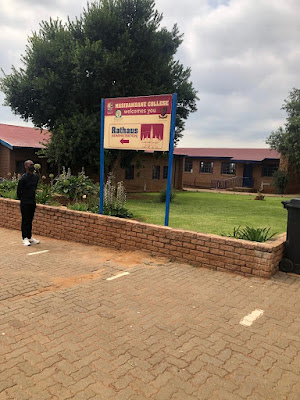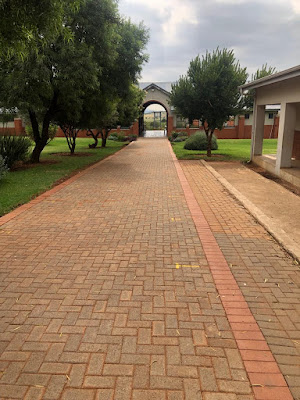About 40 years ago, a young White South African in Johannesburg, James Urdang, decided that he needed to make a difference in the country. He had had the privilege of being educated at a prestigious school in Johannesburg, St. Stithian's, and was appalled at the apartheid government's purposeful attempts to prevent Blacks from getting a good education. He started an organisation called Education Africa.
He became friendly with Black activists like Walter Sisulu, seeking their input into what he was dreaming of. Eventually, with the input from Sisulu, anti-apartheid veteran Helen Suzman, and others, he decided to try to establish a school in one of the poorest areas of South Africa, called Orange Farm, just south of Johannesburg - the biggest and most populous informal settlement in South Africa, poorer even than the sprawling Soweto and other better known townships.
Two weeks ago, Mette and I had the opportunity to visit Masibambane school in Orange Farm.
Urdang's efforts had resulted initially in the establishment of a primary school with financial help from the City of Vienna, and then later a secondary school, with financial support from the Cedar Foundation, a private Canadian foundation, and the Japanese government. Two other groups provided support and funding - the Anglican Church of South Africa and my old high school, St. Johns, which continues its close relationship today.
A small group left St John's in the middle of Johannesburg and drove south to Masibambane College. Even though I am very familiar with the poverty in South Africa, it still takes my breath away to see how bad it is. We drove along potholed roads, flanked with shanties, run-down shops, and hundreds of people, unemployed most likely, just hanging out.
 |
| Poverty |
 |
| Modern upscale home |
We learnt that the graduating classes had posted 100% passes every year since 2013, and the previous year had several student performing at the top levels relative to all schools. It was inspiring.
The reason we were there was because my high-school graduating class of 1963 had raised sufficient funds to ensure all students in their final year would be able to stay in school and graduate. Covid had taken a huge toll on the parents of the students and, even though the school fees were low, many couldn't afford to keep their kids at the school.
In addition, we were able to supplement the money available for school lunches.
As a thank you, we were entertained by the school's marimba band. What a pleasure.
All of this is due to the vision and tenacity of James Urdang. I salute him. What a difference he's made.
Here are some photos from our visit.
 |
| Note the nod to the Vienna city hall |
 |
| Welcoming committee |
 |
| Learning about the history of the school |
 |
| The Vienna Centre auditorium |
 |
| The official welcome |
Here is a (unique) view and clip of the Marimba band.
 |
| James Urdang (2nd from left), 2 friends from high school, and me |

















Very impressive indeed!
ReplyDeleteWhat a great accomplishment for James Urdand et al and wonderful gift from you and your friends to the students and their families!
ReplyDeleteAmazing to see
ReplyDeleteVery inspiring, Stan. When I used to do advising at the local high schools, I loved to offer up inspiring pieces like this. I hoped a secondary benefit would be to encourage higher achievement.
ReplyDeleteAnd I salute you and your classmates, Stan. Well done.
ReplyDeleteWonderful effort, both by Urdang and the Class of 63!
ReplyDelete